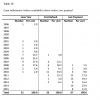Brendan Burgess
Founder
- Messages
- 54,684
Séamus Coffey has compiled a report on 892 cases (1,683 appearances) he has observed in Cork this year
Conclusion
We know there has been a very large increase in the number of legal proceedings issued in relation to defaulting mortgages. The dataset here allows an insight into the outcomes that result in the cases that have been heard before the Cork County Registrar from April to November 2015.
The findings suggest that the borrowers and the lenders are coming to alternative repayment arrangements in a large number of cases and that many of the proceedings will be struck out or adjourned generally. But there will also be a rise in the number of orders granted.Even then there is still some opportunity for the borrower and the lender to reach an agreement meaning that not all orders will be executed.
There will be a rise in repossessions in cases where properties are vacant or where
borrowers are making absolutely no effort to engage with their lender but it will not be a tsunami.

It's interesting that the ratio of completed cases is 185 strkeouts to 79 orders, or roughly 2:1
There are about 18,000 cases before the courts at the moment. If that ratio holds across them all, it would be about 6,000 orders.
However, most of those are for abandoned houses or former homes which are now rented out.
Séamus, Karl Deeter and I have seen almost no repossessions of occupied family homes where the borrower was paying anything.
Brendan
Conclusion
We know there has been a very large increase in the number of legal proceedings issued in relation to defaulting mortgages. The dataset here allows an insight into the outcomes that result in the cases that have been heard before the Cork County Registrar from April to November 2015.
The findings suggest that the borrowers and the lenders are coming to alternative repayment arrangements in a large number of cases and that many of the proceedings will be struck out or adjourned generally. But there will also be a rise in the number of orders granted.Even then there is still some opportunity for the borrower and the lender to reach an agreement meaning that not all orders will be executed.
There will be a rise in repossessions in cases where properties are vacant or where
borrowers are making absolutely no effort to engage with their lender but it will not be a tsunami.
It's interesting that the ratio of completed cases is 185 strkeouts to 79 orders, or roughly 2:1
There are about 18,000 cases before the courts at the moment. If that ratio holds across them all, it would be about 6,000 orders.
However, most of those are for abandoned houses or former homes which are now rented out.
Séamus, Karl Deeter and I have seen almost no repossessions of occupied family homes where the borrower was paying anything.
Brendan
Last edited:
